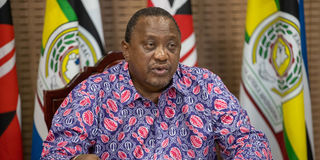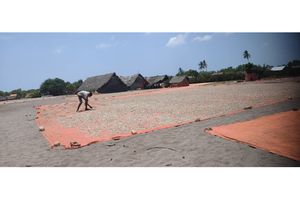Kenyatta defends stalled Nairobi peace process, says it holds key to DRC stability

Kenya's former president Uhuru Kenyatta
What you need to know:
- Mr Kenyatta argued that the two peace processes held the greatest promise for resolving and ending the crisis in eastern DRC.
Kenya's former president Uhuru Kenyatta has defended the EAC-backed mediation process he led, saying it promises a better path to long-term peace in the Democratic Republic of Congo.
Kenyatta's Nairobi process, which was supposed to bring armed groups to the table with the Congolese authorities, has stalled for two years, leading to criticism that it failed.
But the former president defended the two mediation efforts, the other being the Luanda process, saying they had only been derailed by a number of factors, including their mandates, the escalation of fighting in eastern Congo after the DRC elections in December 2023, and the withdrawal of the EAC Regional Force whose mandate his mission was tasked with overseeing.
“The Nairobi Peace Process, though temporarily sidelined, remains a critical framework for dialogue and conflict resolution in the eastern DRC. The Facilitator remains committed to finding pathways to peace, in collaboration with the government of DRC, regional partners, and international stakeholders,” Kenyatta said in a statement issued by his spokesperson Kanze Dena in Nairobi on Thursday.
Mr Kenyatta said he had submitted a report to the African Union, East African Community (EAC) and Southern African Development Community (SADC) secretariats ahead of the joint EAC-SADC summit in Dar es Salaam on Friday and Saturday.
Last week, Rwandan President Paul Kagame told the EAC Heads of State Summit that the Nairobi Peace Process led by President Kenyatta and the Luanda Process led by Angolan President João Lourenço had yet to provide a way forward.
The Luanda Process aims to reduce tensions between Rwanda and the DRC, seen as the source of the armed conflict in eastern DRC, where more than 120 armed groups operate.
Kinshasa accuses Rwanda of arming the M23 rebel group, which last week seized the city of Goma. Kigali has repeatedly denied supporting the rebel group.
Mr Kenyatta argued that the two peace processes held the greatest promise for resolving and ending the crisis in eastern DRC.
“The two processes are complementary and interdependent. It is only through close coordination of the bilateral negotiations between Rwanda and the DRC and the Inter-Congolese Dialogue and Conferencing process that this crisis can be brought to fruitful conclusion.”
He said the solution is based on bringing both the DRC and Rwanda to the negotiating table, while ensuring that the internal dynamics of people and politics in the eastern DRC are managed and directed towards a path of peace and reconciliation through the Inter-Congolese Dialogue process.
President Kagame said the processes had "become an end in themselves".
“People leading these processes became more important than the results of the processes. The Nairobi Process became an ‘Uhuru process’ and then the Luanda Process is like you can’t say anything that will displease President Lourenço. Definitely this does not help deal with such matters as we are faced with today,” the Rwandan leader told his peers last week.
But President Kenyatta sought to explain the mission’s mandate and how the process has been handled since he was appointed to chair the process, saying: “The Nairobi Peace Process was structured around two key elements: political dialogue and military intervention. The political aspect focused on engaging all stakeholders including armed groups, political factions, civil society, and regional partners in an inclusive conversation aimed at resolving the conflict and fostering long-term peace.”
“The military element involved the deployment of the East African Community Regional Force (EACRF) to provide peacekeeping and peace enforcement support, complementing the political dialogue efforts,” he said, adding that the progress through June 2023 was “encouraging”.
“However, in June 2023, as the all-important 4th Inter-Congo Peace Dialogue Conference was set to take place, political attention in the Democratic Republic of Congo shifted toward the upcoming national elections that are to be held that year, that is 2023, in December. The shift resulted in the slowing down of the Nairobi Peace Process, and unfortunately, at the same time, a political impasse resulted in the withdrawal of the Kenya forces from the ICRAF.”





